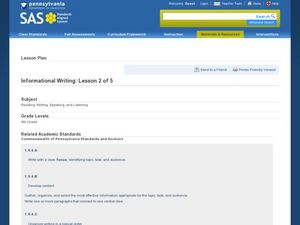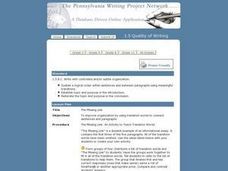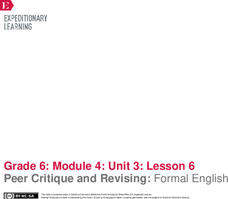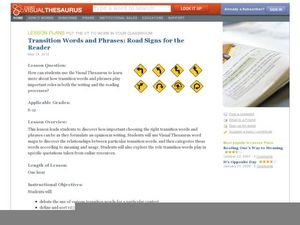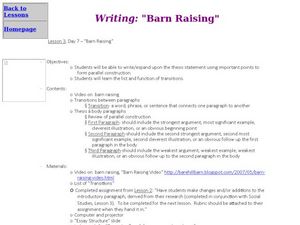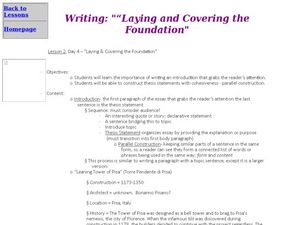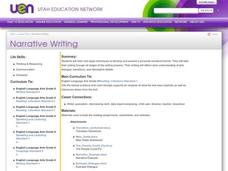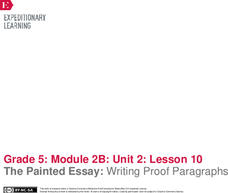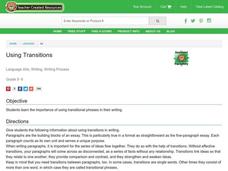Pennsylvania Department of Education
Informational Writing: Lesson 2 of 5
Introduce expository writing to your elementary learners. Young authors write a three-paragraph informational paper using the steps of the writing process. They follow guided lessons to experience each of five steps. Included are tons of...
Curated OER
Organizing by Writing
Middle schoolers analyze how to use writing for generating and organizing their thoughts before communicating them. They use the questions on the first handout to organize a three-minute introduction of themselves to their small group....
MENSA Education & Research Foundation
The Writer’s Toolbox: What You Need to Master the Craft
Strengthen your high schoolers' writing with a series of steps for writing successfully. With sections on organizing an essay, choosing a topic, crafting a thesis statement, and revising a draft, the lesson encourages your class to...
Curated OER
8-Sentence Accordion Paragraph Practice
Organization can take a paragraph from mundane to first-rate. Try out a graphic organizer for an accordion-style paragraph, which includes a topic sentence, three reasons with details and transitions, three explanations, and a concluding...
Curated OER
The Missing Link
What is the missing link? Provide your class with this incomplete essay (it's missing transition words), and have writers place words from the transition word bank into the essay. Also, since only three of the five paragraphs are...
EngageNY
Peer Critique and Revising: Formal English
Dear Sir or Madam: What's the difference between formal and informal language? Scholars focus on using formal English and transitions in their position papers. After revising their rough drafts, they engage in the peer editing process...
Curated OER
Transition Words in Expository Writing
Create to learn! Your class can create posters of transitional words and phrases to help them compose an explanatory text. They work in groups and focus on one type of transition (time, place, importance, etc.). They also create a poster...
Curated OER
Transition Words and Phrases: Road Signs for the Reader
Therefore! However! Furthermore! Explore the power of transition words and phrases. Signal your readers by suggesting the relationship between different thoughts or points. Help them demonstrate an understanding of word relationships.
Curated OER
Transitions
Give examples of transitions and why they are necessary in writing. A bit verbose, this handout is very thorough and provides many examples. The second page lists plenty of transitional phrases in a convenient chart.
Curated OER
Writing: Barn Raising
Young writers compare writing a paper to building a barn. They write a thesis statement using parallel construction and use transitions to hold the paper (walls of the barn) together. A barn raising video link is included; great for...
Curated OER
Writing Transitions: However, Nevertheless, Still, Despite That Nonetheless, Even So
Use a writing transitions instructional activity to help your class sharpen their writing skills as they read several examples, and rewrite seven sentences using the words however, nevertheless, still, despite, nonetheless, and even so...
Curated OER
Common Transition Words: Grades 4 - 12
A practical guide to transition words and phrases, this handout could be a useful addition to any pupil's notebook or binder. Transition words are placed in a chart and labeled by type. For example, words that show comparison are grouped...
San José State University
Transitive and Intransitive Verbs
Clarify the difference between transitive and intransitive verbs and when to use lay versus lie. Various examples are given before writers practice underlining verbs, circling the object of each verb, and filling in sentences with either...
Curated OER
How to Write an Essay: Secondary ed.
Whether introducing the structure of expository essays or reviewing the format with your high schoolers, take the time to check out this resource. Examples of seven common forms of introductory paragraphs and six types of conclusions, as...
Curated OER
Writing: Laying and Covering the Foundation
Your middle schoolers can become stronger writers with a lesson covering the basics. They compose effective thesis statements and introductions, discuss different ways to capture a reader's attention, and compare a poorly written...
Curated OER
Narrative Writing
Binoculars are used as a metaphor for good descriptive writing. Class members first view a small picture and then an enlarged view of the same image in which the details come into focus. Next, learners examine a paragraph lacking sensory...
Curated OER
Proofreading, Revising, & Editing Skills Success
Some self-paced writing resources are just better than others. This one is great. The 205-page packet includes exercises on every aspect of the writing process, from crafting sentences and paragraphs, to proofreading, revising, and...
Curated OER
Using Transitions
Transitions, words that reveal the relationship between two ideas, are the subject of a presentation that provides color-coded illustrations to show viewers how this part of speech functions in sentences. The PowerPoint concludes with an...
Curriculum
Expository Writing
The beauty of the way this expository writing resource is structured is that the units can be presented as a complete writing workshop or sequenced throughout a course of study
EngageNY
Writing Dialogue: Revising Historical Narrative Drafts to Add Dialogue
Young writers have written, revised, and peer-edited their historical fiction narratives by the 10th lesson plan in a language arts unit. Fourth graders finally combine their revision notes to create a second draft. The double-spaced...
EngageNY
The Painted Essay: Writing Proof Paragraphs
Words of proof. Learners continue coding The Electric Motor by marking the first point in yellow and the second point in blue. They discuss the structure of the paragraphs by identifying transition words and evidence to support the given...
Education.com
St. Patrick's Day Writing: If I Found a Pot of Gold...
This St. Patrick's Day, young writers imagine they found a pot of gold at the end of a rainbow. After a class discussion and brainstorming, scholars compose a narrative essay making sure they incorporate transitions and at least three...
Curated OER
Topic Sentences and Transitions
High school writers identify the purpose of both a topic sentence and a transitional statement. They write a topic sentence which denotes the paragraph topic and the author's stand on that topic. Then they write an effective transitional...
Curated OER
Using Transitions
Students explore the importance of using transitional phrases in their writing. They discuss why transitions are important to their writing and various types of transitions that they can use. Students practice using transitions in their...


